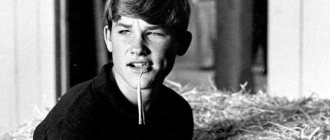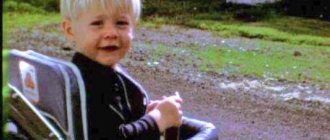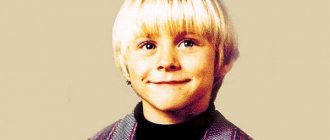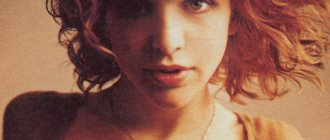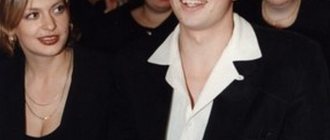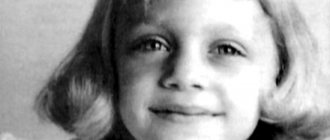Biography of Kurt Cobain
Kurt Donald Cobain is from Aberdeen. His father is a maintenance mechanic and his mother is a waitress. Cobain's early interest in music is understandable, since he grew up in a creative family. My aunt was a guitarist and my uncle was in the band The Beachcombers. Kurt's grandfather was a singer and got a role in the movie "King of Jazz". At the age of 4, the boy composed a song about a walk in the forest. For his seventh birthday, his aunt gave the future musician a drum set. Kurt also had a knack for drawing.
A year later, the parents filed for divorce. The boy stayed with his mother, but his communication with her boyfriend did not work out. Soon Kurt moved in with his father. He also quickly arranged his personal life and married Jenny Westby. She had children from her first marriage and gave birth to another son for Cobain's father. Things didn't work out with Jenny either; he went to live with his grandparents.
At the age of 14, Cobain took up playing the guitar. He was helped by a member of The Beachcombers. Once, in one of the issues of Cream magazine, a guy read about the Sex Pistols. After listening to their music, Kurt wanted to form his own punk band. Then he met the guys from the Melvins group and began attending their rehearsals.
In 1984, Cobain returned home. His mother lived with longshoreman Pat O'Connor, who often beat her and drank heavily. Kurt quarreled with his mother over his stepfather. After finishing school, he left home. It was a difficult period for the young man. Cobain lived with friends, moving from one to another. In May 1986, Kurt broke into someone else's house. He was remanded in custody for a week.
Later the guy got a job and founded the group “Fecal Matter”. It included drummer Greg Hokanson and guitarist Dale Crover. The team quickly disbanded. Kurt began showing a demo version of his song to his friends. This is how the track fell into the hands of Chris Novoselic, whom Cobain met at the rehearsals of the Melvins team. After listening to the song, he invited Kurt to put together a group and invited Chad Channing to join the team. The friends spent a long time looking over names for their rock ensemble and decided to settle on “Nirvana”. In 1988, their single “Love Buzz/Big Cheese” premiered, and a year later the album “Bleach” appeared.
In 1991, Nirvana's second album, Nevermind, was released. The song “Smells Like Teen Spirit” ended up in rotation on MTV, and the guys gained unexpected popularity. The group gained many fans, and Cobain was called the “voice of a generation.” However, close attention only irritated the musician. After all, the group was originally conceived as an underground one, and Cobain did not at all want to become a youth idol.
The style of the third disc “In Utero” turned out to be dark and heavy. Its producer is the lead singer of the Big Black team. This album did not create such a sensation as the previous ones, but Kurt Cobain's songs were very popular and occupied the leading positions in the charts.
Cobain was an ardent defender of the rights of women and sexual minorities. In 1992, the collection “Incesticide” was released with rare demos and recordings of Nirvana radio broadcasts. The booklet for the record contains the following words: “If you hate homosexuals, women, people of other races, do not come to our concerts, do not buy records.”
Kurt Cobain's daughter was also raised by a male nanny "Mustachioed nanny": why do stars hire men to look after children Courtney Love and Kurt Cobain with daughter Frances Bean The Addams Family: Frances Bean Cobain with her mother at the premiere of a film about her father Courtney Love and Kurt Cobain with daughter Courtney Love is looking for the “new Brad Pitt” to play Kurt Cobain Kurt Cobain Courtney Love is looking for “the new Brad Pitt” to play Kurt Cobain
Kurt Cobain Courtney Love seeks 'the next Brad Pitt' to play Kurt Cobain
The spirit of Kurt Cobain advertises the scent Smells Like Teen Spirit on the poster What Rihanna and Lana Del Rey would look like in a retro beauty ad Kurt Cobain with his daughter Frances Groom Frances Bean Cobain is a copy of her father Kurt Cobain with his daughter. The rocker's friends recalled in various interviews that Kurt “adored little Frances” An apple from an apple tree: Kurt Cobain’s daughter went all out Young Kurt Cobain What Jolie, DiCaprio, Jovovich and other celebrities looked like in their youth
Courtney Love herself will play Scarlett Johansson Robert Pattinson will play Kurt Cobain
Every girl dreamed of Nirvana lead singer Kurt Cobain. And he dreamed... of committing suicide, despite the fact that he had a brilliant career, a loving wife and a little daughter. Drug addiction drove the brilliant musician... What stars who died young would look like in old age
If Kurt had remained alive, the world would have heard many more brilliant works. We are sure that even in old age Cobain would remain the idol of millions. What stars who died young would look like in old age
Frances Bean Cobain (24 years old) Kurt Cobain's only daughter Frances in her youth was going to follow in her father's footsteps, but quickly abandoned this idea and became an artist. In 2010, a show of her paintings, Children of Celebrities, took place at a Los Angeles gallery.
Frances wasn't even going to be a good girl. She tried everything: tattoos, piercings, pink hair, alcohol. At some point, rumors appeared that Cobain followed in the footsteps of her parents and began using illegal drugs, but fortunately... Children of celebrities Courtney Love - the death of Nirvana leader Kurt Cobain April 5, 1994 Two months after the suicide of the legendary musician Kurt Cobain, rocker Eldon Hawk spoke to the press, claiming that a few days before the tragedy his girlfriend... The Fault in Our Stars? 7 famous personalities involved in the tragic death of colleagues in show business
Immediately after the tragedy with Cobain, many fans really attacked Love with accusations. She did not deny that there had been serious problems in her marriage for a long time... It is curious that the police forced Eldon Hawk to undergo a detector test... The Fault in Our Stars? 7 famous personalities involved in the tragic death of show business colleagues Kurt Cobain (died in 1994) As you may have guessed (or knew), Kurt also became a member of Club 27. And among other members of Club 27, his death left the most questions. The musician's body was found on April 8, 1994, with his dying body lying nearby... Celebrity deaths
Even those people who don't like rock, punk and grunge know Nirvana songs. Several generations grew up on Smells Like Teen Spirit, Lithium and other compositions by Kurt, because it was he who erased the boundaries between the worlds of popular music and alternative rock.... Celebrity deaths
“Club 27” Many fans are sure that the deaths of Jimi Hendrix, Amy Winehouse and Kurt Cobain are associated with a mystical phenomenon, which was given the name “Club 27”. According to these rumors, some evil spirit is literally destroying all the most talented... Celebrity deaths “I never cheated on him,” Courtney Love later admitted. “But I thought about it once.” It seems to me that Kurt tried to commit suicide because of this: he felt everything.” Courtney also claimed that she had found a suicide note... Stars who managed to come out of a coma For some time, Frances was predicted to have a modeling career, because she had everything she needed for this: a spectacular appearance and a big name. However, Cobain herself was not attracted to this prospect. Sometimes a girl stopped taking care of herself and gained extra... Children of celebrities
6 weeks before his death, Kurt Cobain fell into a coma: the musician took a dozen tranquilizer tablets, washed down with champagne, while his wife, suspecting nothing, slept Stars who managed to come out of a coma
Nirvana became for us something much more than just an unhealthy cult of death that befell the band's lead singer. The contradictions between their punk ethic and mass appeal, between their legendary angst and incredible success, made Nirvana the premier rock phenomenon of our era.August 1991: A week later, on Friday, Nirvana will play among other bands at the Redding Festival, a month later, Nevermind will be released, and a few months later, Nirvana will be hailed as the greatest rock band in the world.
While they're on tour in Ireland, NME journalist Keith Cameron asks Kurt if he thinks people take rock 'n' roll too seriously. “Too seriously,” Cobain replies. “People have too high expectations for rock and roll. They hope it can be used for political purposes, when in fact rock 'n' roll should be nothing more than background music." “So you're saying that you never thought rock 'n' roll was that big of a deal?” - Keith insists. “Well, actually, music has completely changed my life,” Kurt softens. “Punk rock opened my eyes to the world so wide that I simply couldn’t believe it. If it were not for him, it is unknown whether I would ever be able to remember that I am a separate, independent person. In general, rock music is a terribly important thing. The thing is,” he laughs, “people are blowing it out of proportion.”
If only Kurt Cobain were alive and thought about his words now... That summer of 1991, he carelessly made a plan for the future. Nirvana's music would truly change his life once and for all and would influence the lives of millions more to varying degrees over the next ten years. Music will give him strength, help relieve pain and, at least for a short while, get rid of self-pity and constant internal tension. But in return, it will bring incomparably greater pain and anxiety, because because of it, Kurt will have to enter into a spiritual connection with the mass audience, contrary to his nature, and face the world of show business, which he despised.
Eight and a half years after Kurt's death, we now have the opportunity to take a slightly clearer look at his life. And now it seems that Kurt Cobain died from the same thing that made his music so powerful. Nirvana was mired in controversy. Preaching underground ethics - and creating pop anthems for a generation. The desire to be heard by the whole world - and the horror of the pressure that popularity entailed. A passionate desire to remain honest - and an equally strong need to keep your inner world secret. The success of Nirvana's music seemed directly related to the difficulties of Kurt's personal life. But it can hardly be said that this was precisely the reason for his suicide. We are all amateur psychologists, and we can all point to a difficult childhood, chronic stomach pain and, to a large extent, associated heroin use as factors that ultimately led to the tragedy. Or simply call Kurt a martyr genius, another fallen hero, and squeeze his life into the standard framework of a tragic rock star.
All these explanations are untenable, if only because Nirvana's music has much more bright moments than suppressive and depressive ones. “Nevermind” is an enthusiastic record: impudent, abusive, toxic, sometimes even too smooth. But behind Kurt's cryptic words lies a loud challenge to all his enemies, real and imagined, lined up in front of Cobain and his fans. In Nirvana songs, the feel of the lyrics is much more important than the actual meaning of the words. The genius of Kurt Cobain was that he was able to turn a man's quiet pain into a powerful force.
Perhaps this is why the songs he left behind acquired such a long and glorious life. In 2003, Kurt Cobain meant much more than even his most passionate admirers could have imagined. Take a look at one of last year's biggest acts, Nickelback, and you'll see a dynamic inspired by Nirvana, a sadness tailored to suit them. Or look at a better example - The Vines, who used the same dynamics to give it the necessary spontaneity. Craig Nichols understands more clearly than most of Kurt's followers that such music touches the soul and amazes only when it comes directly from the heart. The smoothing of grunge would have disgusted Kurt Cobain. After all, whatever one may say, rock and roll in his time was something immeasurably more than just a musical background...
To be fair, NME wasn't the first to spot Nirvana's powerful potential. In 1989, when the band played their first shows in Britain and released their debut album Bleach, we limited ourselves to commissioning our diligent chronicler of the American underground, Edwin Pouncey, to write about them. “This is the loudest and baddest sound that Sub Pop's worthy answer to The Beatles has yet unearthed.”
NME at that time paid more attention to what was happening under our noses, and paid almost no attention to events on the other side of the Pond. In 1989, we had nothing to do at all - after all, we had The Stone Roses, who completely blew our minds and became the first who managed to prove: a group from their backyard could become the biggest phenomenon of a generation and at the same time not lose any of their sincerity. Nirvana would do exactly the same trick two years later, but only on a global scale. There were hints of this breakthrough already in "Bleach": on first listen, Nirvana seemed like just another dirty group of fake rednecks from Seattle, not much different from their label mates Mudhoney and Tad. But songs like the unrealistically beautiful “About A Girl” made it clear to the most attentive listeners that Nirvana’s potential was a hundred times greater. This was a band that could, if they wanted to, create flawless pop songs in the depths of their noisy fury. In 1991, Kurt Cobain said: “My favorite songs are pop songs. Pop means simple, and punk rock was always simple until it turned into hardcore.”
In early 1991, NME wrote about Bleach in a completely different way: it was an album that "turned thrash on its head, turning it into a shapeless but extremely bright mess of melodies and brute force." That's when we published our first big interview with Nirvana, coinciding with the UK release of their single "Sliver". Recently recruited into the band, Dave Grohl either didn't show up for the interview or slept through the entire conversation, but for the most part, bassist Chris (later changing the English spelling of his name Chris to his birth name Krist) Novoselic answered the questions. Cobain, who at the time insisted that his name be spelled Kurdt Kobain, talks mostly about how much he loves his pet turtles, but also has a few words to say about the band's plans and reveals that they like pop music. music. Cobain seemed to go out of his way to separate himself and his band from the hardcore snobbery that characterized the underground scene at the time. But soon after the release of Nevermind, it became obvious that both in music and in his views, Kurt shared the point of view of his uncompromising friends like The Melvins and Earth, whose love of pop music was expressed, to put it mildly, not very brightly.
Nevermind was released in September 1991, five months after Nirvana parted ways with Sub Pop and signed with David Geffen's powerful DGC label. Reviewing the album, NME writer Steve Lamacq wrote: "This record will set a new benchmark for the future generation of post-hardcore." In fact, “Nevermind” became not just a new, but the only reference point for an entire generation. Cobain never hid the influence that other bands had on his music: his love of the Beatles and his obvious riffs on the Pixies (particularly the wistful verses and howling choruses that birthed “Smells Like Teen Spirit”) were clear to everyone. But no one has ever managed to distort the original sources with such genius, charm, power and explosive emotional impulse as Nirvana did. "Nevermind is a very solid album," Krist Novoselic told Keith Cameron in March 1992. “It’s only a little more complicated than everything generally accepted.” It's a pop record. The guitars on it are just heavy.” At the time of this conversation, Nirvana had already reached number one on the American charts. In the November 1991 issue of NME, our writer Mary Anne Hobbs wrote: Nevermind is one of those albums that stays with you for a lifetime. He will survive all the strife, disputes and gossip...” In this article, Hobbs had to write a lot of “words of the author”, because in a conversation with her Kurt was demonstratively angry and said almost nothing. When Hobbs asked him what he thought about the massive fame that awaited the band now that they were on MTV, he just shrugged: “We'll do something to screw it all up,” he said. “I'm absolutely sure.” "
Throughout 1992, the buzz around Nirvana and Kurt Cobain's personal life only grew. While Geffen was squeezing out all the juice from “Nevermind,” releasing track after track as singles, the press focused on Cobain’s relationship with Courtney Love. The lovers got married in February, and their daughter, Frances Bean, was born in August. In between these two events, a grueling European tour took place, during which Cobain took huge amounts of heroin. By the time Nirvana performed at the Reading Festival, conversations about the health of the band leader were perhaps the most popular among music fans. Nirvana closed the last day of the festival, Sunday, and Kurt then appeared on stage in a long white wig and in a wheelchair.
Over the next few months, Cobain became increasingly irritable and drug-dependent, and it was during this period that he decided to take on the task of restoring Nirvana's underground presence. The spotlight was one of the hardest experiences in Kurt's life - perhaps because of this, he so dreamed of returning to those times when Nirvana played as an opening act for more famous bands and quietly enjoyed life. In March 1993, nostalgic for the past, Kurt released a new song called "Oh The Guilt" and put the band in the studio to begin work on a new album. He chose Steve Albini as producer, a real threat to the American mainstream, who was famous for not allowing any embellishment in the recording process and for writing the most brutal music in his alternative groups Big Black and Rapeman. America fearfully prepared for Nirvana to emerge from the studio with a bile-soaked album full of incoherent noise. But Kurt Cobain was much smarter than many might think. In July, Keith Cameron attended a Nirvana performance in New York and heard several new absolutely killer compositions, as well as a couple of quiet, beautiful songs with an acoustic guitar and cello. Cobain, as always, was completely unpredictable. Discovering more and more new talents in himself, he deliberately tried to scare away fans of the Nevermind album with the help of too loud and too soft experiments.
The resulting record, In Utero, was a complete expose of Cobain. The cover depicted a three-dimensional anatomical model of a person, which had long occupied the imagination of Kurt, whose physical condition since early childhood left much to be desired - no other associations, except for an anatomical dissection, when looking at this cover, listeners concerned about Kurt’s illness arose. With a new furious album, Kurt attacked the annoying representatives of the press, and at the same time his fans, telling about his problems in between outbursts of anger. The original title of the album conveyed its essence very well: it was called “I Hate Myself And I Want To Die” (“I hate myself and want to die”). It was a cry for help, similar to those that littered Kurt's diaries, but no one took it seriously at the time. The album was wonderful. When it was released in September 1993, your correspondent wrote: "In Utero" is a very confusing album... It's like the greatest band, rushing around looking for a place where it would be happy. Complete chaos, but extremely interesting chaos.” Now, 10 years later, In Utero sounds completely different and appears to be Nirvana's most complete and best album yet. Thanks to the mood swings, "In Utero" turned out to be more varied than "Nevermind", and the sincerity of the songs this time was simply absolute.
Cobain had always wanted to be seen as a loser, and now, with the release of his third album, the music business had figured out how to take advantage of Kurt's oddity: they had on their hands not just a superstar, but a superstar loser, not just a genius, but a depressive genius. A new generation of rebellious grungers and yearning poets was about to be born, but their rebellion and melancholy were carefully and clearly calculated.
Meanwhile, Nirvana experienced one success after another. In November, they recorded the famous MTV Unplugged performance, in which they emphasized their fragile, acoustic side and again, instead of scaring off some of their fans, they attracted listeners who were turned off by the previous Nirvana with excessive noise and chaos. Cobain was unlucky again: no matter what he did to become more underground and spoil his reputation as a pop star, it only turned out worse: his popularity grew day by day.
Nirvana's subsequent musical history is tragic. In February 1994, the group embarked on a European tour that ended a month later in Rome when Cobain took too much Rohypnol. In April, Kurt went to a rehabilitation clinic in California, but two days later he escaped from there and on April 8 he was found dead at his home in Seattle, with a gun in his hands. A few weeks earlier, during his last photo shoot, Kurt posed with a toy gun, the barrel of which he pointed at his mouth: he had joked about suicide so many times that committing it seemed like a no-brainer for Kurt.
What makes Kurt so cool? It’s not that he died young; that’s not why we remember him. The coolness of Cobain is how limitless his influence on music turned out to be: thanks to him, not only an entire generation of schismatic emo, indie and garage bands was born, but also a succession of artisan grunger artists. All in all, rock 'n' roll is an incredible force in good hands. Is he worth dying for? Come on, don't be ridiculous. Life is much more complex than you think and deserves better use.
Kurt Donald Cobain
Date of birth February 20, 1967 Place of birth Aberdeen, Washington, USA Date of death April 5, 1994 (27 years old) Place of death Seattle, Washington, USA Country USA Profession vocalist, guitarist, drummer Genre grunge Band Nirvana
Since childhood, Kurt was a very creative child and his mother instilled this in him.
But Kurt’s carefree childhood ended after his parents’ divorce, because of this he considered himself inferior. Kurt Cobain. “Suffice it to say that he grew up in a remote American province, Aberdeen (Washington State), where the majority of the population worked in logging, and hypocrisy was the norm of life. In this very “puritanical” swamp, he managed to become not just a musician, but a punk rocker... Soon Kurt made friends with a guy who immediately admitted to him that he was gay. The guy introduced him to his lover. The trio began to have fun. The vigilant public could not ignore this fact... But having become an icon of modernized punk - grunge, Kurt flew at supersonic speed along the path of self-destruction. Heroin, heroin and more heroin. The rebellion that Kurt began during his school years continued into his years of musical maturity."
Since childhood, he had poor health, and in the last year of his life he used heroin in very large quantities, smoked a lot, and became extremely nervous: “He was scared, it seemed to him that people were following him, that his conversations were being listened to,” recalled someone who knew Kurt closely. reporter Frank Hulme. He suffered severe overdoses several times. “Our relationship was going through difficult times because of Kurt’s frequent drug use and because I tried to stop him,” Love said. One day she had to call the police - she claimed that her husband had locked himself in the bathroom with a gun (Cobain was fond of shooting, he had a collection of weapons) and was threatening to commit suicide.
In March 1994, in Rome, Cobain nearly died from an overdose of Rohypnol (a tranquilizer used, in particular, to relieve heroin withdrawal symptoms): apparently, he took about fifty pills and then washed them down with champagne. Courtney Love saw him lying unconscious and called an ambulance; At the hospital, Kurt stated that it was just an accident, but many believe that it was a suicide attempt. Some sources indicate that he left Courtney a note: “You know, I love you, I love Frances, and I'm so sorry. Please don't follow me... I will protect you from there. I don't know where I'm going. I just can't be here anymore."
Just a few quotes.
“When I realized that I wouldn’t find a person like me, I just stopped making friends with people.
-I never craved fame or anything like that. It just so happened...
-When I started taking heroin, I knew that it would be as boring as smoking marijuana, but I couldn’t stop, heroin became like air!
-If I go to jail, at least I won't have to sign autographs.
- I love everyone - that’s what’s sad...
-I'm not afraid of death. When you die, your soul continues to live and becomes absolutely happy. Complete peace after death, rebirth into someone else - this is the greatest hope of my life...
-Live to the fullest, die young and leave a beautiful corpse.
“It’s better to be dead than cool.”
-Until I was 9 years old, I was firmly convinced that I would become either a rock star, or an astronaut, or a president...
Death
On April 8, 1994, Cobain's body was discovered in his home in Seattle's Lake Washington area by an electrician who had come to install a security system.[8] The electrician initially assumed it was a dummy, as he did not notice any noticeable injuries other than a small amount of blood from the ear and saw a gun lying across Cobain's body.[8] Kurt left a suicide note in which he wrote: "I haven't felt the excitement of listening to or creating or writing music... for so many years." The protocol for the inspection of the scene of the incident was drawn up formally, without an in-depth analysis of the details. According to one version of the investigation, Cobain injected himself with a dose of heroin that was incompatible with life and shot himself in the head with a gun. Criminologists also concluded that Kurt died on April 5 and his dead body lay in the house for several days. There is also an assumption about the intentional murder of Kurt. Courtney Love was unofficially included in the list of suspects.
After cremation, some of Cobain's ashes were scattered over the Vishka River in Washington state, and Courtney kept some for herself. An unofficial place of tribute to the singer is a memorial bench in Viretta Park, located near Cobain's last home. [edit] Version of murder
The first theory about Cobain's murder was expressed by American journalist Richard Lee, who, a week after the musician's death, released a series of programs, Kurt Cobain Was Murdered. In them, he described details of police reports and video footage as implausible.[9]
A later prominent supporter of the murder theory was Tom Grant, a private investigator hired by Courtney Love after Cobain escaped from rehab. Grant's main arguments were the following statements: about the extremely high level of heroin in the musician's blood. Not one, but three lethal doses were found in Kurt's blood: a person in such a state is unlikely to be able to put the syringe and accompanying tools back into the box, take the gun and shoot yourself in the head). about the suicide note According to Grant, Cobain's suicide note did not contain a direct indication of his death. In it, he wrote about leaving the stage, parting with his family, and asked his loved ones for forgiveness. The last lines: “Courtney, don’t stop - for Frances’ sake, for her life, which will be much happier without me; I love you” - were written with more force than the entire note, and, according to supporters of the murder version, were added later by an outsider. Grant interviewed four handwriting experts, but only one of them concluded that the final lines were written by someone else. The remaining experts agreed that the material presented was not enough to make a clear decision. about fingerprints: Not only were there no “extraneous fingerprints” found on the gun with which Kurt allegedly shot himself in the head, but also Kurt’s own fingerprints.
Suicide note
In the language of an experienced simpleton who would clearly prefer to be a lethargic, childish whiner. This note will be fairly easy to understand. All the warnings of the punk rock crash course over the years, since I became familiar with, so to speak, the ethic of independence and acceptance of your community, turned out to be really true. It's been many years since I've felt nervous when listening to music, or when making music, both at concerts and while composing. I can’t put into words how ashamed I am about all this. For example, when we're backstage and the lights come on and this crazy roar of the crowd starts, it doesn't move me the way it did with Freddie Mercury, who seemed to enjoy enjoying the love and adoration of the crowd, which I'm very surprised and envious of. The point is that I can't deceive all of you, none of you. It just wouldn't be fair to you or me. The worst crime I can imagine is to deceive people with such pretense and pretend that I feel 100% joy. Sometimes I feel like I wish I could stop the clock when I go on stage. I tried to do everything in my power to come to terms with it. And I humbled myself, God, believe me, but it’s not enough. I understand that we touched someone’s feelings, entertained someone, not just just someone, but a lot of people. I must be one of those narcissistic patients who only begins to value something when it is no longer there. I'm too sensitive. I need to drown out my feelings a little to regain the enthusiasm I had as a child. During our last three tours, I have become much more understanding of all the people I knew personally and the fans of our music, but I still can't get over the disappointment, guilt and pity I feel for everyone. There's good in all of us, and I think I just love people too much. So much so that it is precisely because of this that this damn sadness overcomes me. Sad, small, sensitive, valueless Pisces man (Kurt's zodiac sign - editor's note). My God! Why doesn't this suit you? I don't know! I have a goddess wife who is full of ambition and compassion, and a daughter who is so much like the person I was. Loving and cheerful, greeting every person she sees because everything is good and does not harm her. And it terrifies me to such an extent that I can hardly contain myself. I can't stand the thought of Francis becoming the same miserable, self-destructive rocker that I have become. I'm doing well, very well, and I'm grateful, but from the age of seven I began to hate all people. Only because it seems so easy for them to live and feel compassion. Compassion! Only because I love and pity people too much do I get something in return. I thank you all from the depths of my burning, writhing stomach, for your letters and support in recent years. I'm too weird, a gloomy child! I no longer have passion and therefore, remember, it is better to burn out than to dissolve. Peace, love, compassion. Kurt Cobain. Frances and Courtney, I will be at your altar. Please move on, Courtney, for Frances' sake, for her life's sake, which will be much happier without me. I LOVE YOU, I LOVE YOU
